fefds
fefds
fefds
fefds
fefds
fefds
fefds







Additional challenges (Student teams and Honours)
Next to the bachelor’s programme, there is the possibility to do something extra during your studies, such as the honours programmes or participation in one of the student teams.
Honours Programme
Are you talented and do you have an entrepreneurial mindset? Do you like to think out of the box? Do you push the boundaries of disciplines and do you look for ways to make sure your ideas have an influence on society? If that’s you, then the University of Twente has a challenging programme for you: the honours programme. The University of Twente offers an intensive and interesting programme that challenges ambitious students to perform their best. Our programmes are high tech, human touch: it combines technology and social sciences. The honours programme in the bachelor’s programmes is mostly broadening.
The programme starts in February each year and is only open to the top five percent students of each programme that the University of Twente offers. In about one and a half year you will follow a programme of 30 ECTS. As the programme is open to all sorts of bachelor’s students, you will work with an interdisciplinary group with excellent and motivated students. During the programme, you will be intensively guided and lectures will be given by a select group of scientists with different backgrounds and from different research areas. You will learn about scientific breakthroughs and revolutionary designs, and you will learn to ask questions about everyday technology. You will also learn how to write a research proposal and you will work with a team on a final assignment.
Student Teams
At Advanced Technology we encourage students to do something extra next to their bachelor’s programme. A lot of AT students decide to join one of the student teams: multidisciplinary teams in which students from different educational programmes join forces.
Below you can read some experiences from AT students that are active or have been active in one of the student teams.
Hi, my name is Annefleur Uitzetter and I am currently a third-year student in Advanced Technology. During my studies, it came to my attention that the University of Twente offers plenty of activities to meet new people and grow your skills. As I wanted to boost my practical skills as well as my soft skills, I decided to become a part-time member of student team Green Team Twente during my second year. 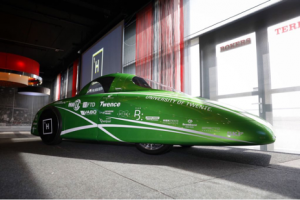
Green Team Twente is a student team that is pioneering sustainable mobility, as the team designs, builds and races one of the world’s most fuel-efficient hydrogen cars. It is an international multidisciplinary team that consisted in my year of 23 students who all believed in hydrogen as the perfect alternative for fossil fuels. Every year Green Team Twente participates in the Shell Eco Marathon, where it competes with student teams from all around Europe for the title of Most efficient hydrogen car.
In my year, we build a brand new hydrogen car from scratch. Thereby, it came to my attention how important it is to see the interrelation between different disciplines. I realized that my study Advanced Technology allowed me to do so, as we had already experienced many different settings in which we had to solve problems. By combining my diverse knowledge, I was able to examine problems from different perspectives. 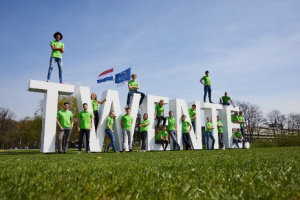
Of course it was not only sunshine and rainbows. We had months which were filled with setbacks, hard work and not much sleep. Although, this does not sound as a great experience at all, it certainly was. While being part of Green Team Twente, I learnt how to turn an idea from paper to reality, overcome obstacles and most importantly, we had a great time with each other. The common goal encouraged us to get the best out of one another. We complemented each other well and I learnt a lot from each and every one. So if you ever have the opportunity to become part of a student team, I can only recommend it!
Imagine driving a hyper-efficient racing machine that you built, together with fellow students, through 3000km of the Australian outback, solely powered by solar energy. A car with an air friction coefficient similar to the mirror of a Ford Transit and which requires less electrical power than a hairdryer to cruise at 90km/h. That’s what you will do when you join Solar Team Twente, one of the student teams at the UT. We compete in the biannual World Solar Challenge in Australia and last September, we became European champions for the second time in a row. After finishing my bachelor Advanced Technology, I joined the Solar Team as an aerodynamics engineer and later on, after the production started, I started working on the race strategy. Joining a student team is one of the amazing opportunities available to you when studying in Twente.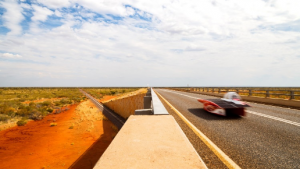
Already right from the start of the project, I experienced the added value of my AT background. A solar car contains elements from many different engineering disciplines including, but not limited to, aerodynamics, composites, mechanics, and electronics. It became very clear to me that one does not design the best solar car by merely optimizing all individual aspects of a solar car: aerodynamics but that one continuously has to make tradeoffs between all disciplines and precisely that is where AT students are at their very best. A good example of this is the interface between the solar array and the aerodynamically shaped wing profile of the car. To maximize incoming solar radiation an electrical engineer would prefer a perfectly flat upper area of the car. However, the aerodynamic engineers would prefer a heavily double curved shape with very low air resistance. The question that arises then is ‘what is the optimal shape which maximizes the solar income and minimizes friction?’. That’s one of the many multi-disciplinary problems which I had to tackle during my time on the team. I really found that my broad engineering background helped me a lot to solve problems like this, the project really allowed me to apply the knowledge and skills I obtained during my studies in practical engineering problems.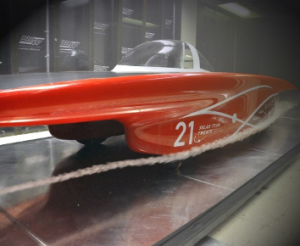
In addition, it was very interesting to go through the entire cycle of product development: from the concept phase at our office in Enschede, to the production of our car at several aerospace companies in the Netherlands all the way to test the car in a wind tunnel and at a race track and finally, of course, the race in Australia. Besides all these awesome moments and all the engineering experience I obtained during the project, I also learned a lot on a personal level. This includes but is definitely not limited to: working very intensively in a team, collaborating with (sometimes very slow) companies, dealing with media, I even saw my own face appearing on the Dutch television… All in all, participating in Solar Team Twente was by far the most amazing experience I have had so far in Enschede and AT taught me several essential skills that helped me a lot during the project.
Hi, my name is Damien Mostert and I have built the third-generation bike of Electric Superbike Twente.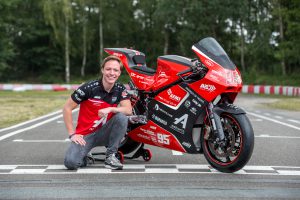
Electric superbike Twente is one of the student teams of the University of Twente. Similar to the Solar team or the Green team, the Electric Superbike team designs and builds an electric vehicle to compete against other teams. In our case, this electric vehicle is an electric superbike that is capable of going 250 km/h and from 0-100 km/h in around 3 seconds. A specially designed electromotor capable of producing 120 kilowatts of power, and a battery pack consisting of 695 lithium polymer cells is what makes all of this possible. Every year around 15 students either part or full time, take on this challenge. These students are chosen from different disciplines to be part of the team to help to try to build the fastest electric superbike in the world.
The team can be divided into management, communications, the chassis (the mechanical parts of the bike), and the powertrain (the electric parts of the bike). My role was Chief Powertrain, which means I was responsible for the powertrain, and, next to that, I was also an engineer in the powertrain. Together with a chassis engineer, I have built the battery pack.
As someone who studied Advanced Technology for two years before joining the team, I can say that a student team such as the Electric Superbike team fits very well with Advanced Technology. Many parts of the bike require knowledge of not only electrical or mechanical systems but a combination of both, let alone other disciplines. Especially as chief, it was really useful to have knowledge about all the systems. Next to that, it is really satisfying to be able to actually apply the knowledge you have gathered during your study on a real-life application instead of just exercises or experiments.
I really liked the projects of AT where you build something interesting with a team however the group projects were always too short in my opinion. Therefore, I wanted to join a student team where you dedicate a full year to building something cool and see the whole process from design to production. I have a passion for motorcycles and therefore Electric Superbike Twente was the best choice for me. We also build the fastest vehicle in comparison to the other teams who want to build the most efficient vehicle and go relatively slow.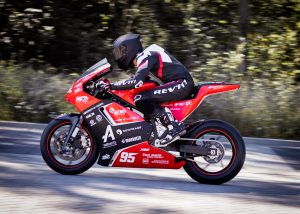
During the year you will learn a lot. For example: Working in a team, working with companies, practical experiences that you do not learn during your studies and how to improvise if your designed component does not work according to plan.
Student teams are challenging and working 60 hours a week is not an exception, but it was a journey that was worth it every second. Your team members will become your best friends and seeing the bike finally drive is a really special moment. Our journey is not yet finished. We were supposed to race in Finland and Bermuda, but those races are postponed to next year, so we are still working part-time to optimize the bike.
If you are interested you can find more information on www.electricsuperbiketwente.nl or follow us on Facebook, Instagram, or Twitter.
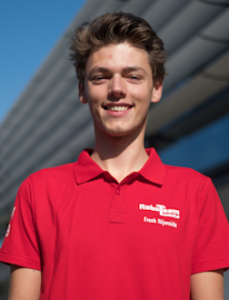 My name is Freek Nijweide, and I am a member of the RoboTeam Twente this year. I will be doing this part-time, as I am a third-year student of Advanced Technology doing minor courses in computer science. I have always loved computers and robots, and that is why I chose to join this team.
My name is Freek Nijweide, and I am a member of the RoboTeam Twente this year. I will be doing this part-time, as I am a third-year student of Advanced Technology doing minor courses in computer science. I have always loved computers and robots, and that is why I chose to join this team.
RoboTeam Twente makes small robots that can autonomously play football as a team. Each year, we send our team to the RoboCup, the biggest international robotics competition in the world. No human control is allowed during these matches, so the robots must play on their own, which is quite a 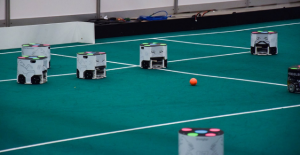 challenge for the teams. Small mistakes can lead to the entire system freezing up, which is why there is no room for error. All components of the robot must be functioning correctly and interact with the other components: the mechanical parts, electronics, control software for the motors, and the AI-based tactics. I will mainly be working on the software, but my Advanced Technology background helps a lot in understanding problems in other disciplines as well, which is great for such a multidisciplinary project!
challenge for the teams. Small mistakes can lead to the entire system freezing up, which is why there is no room for error. All components of the robot must be functioning correctly and interact with the other components: the mechanical parts, electronics, control software for the motors, and the AI-based tactics. I will mainly be working on the software, but my Advanced Technology background helps a lot in understanding problems in other disciplines as well, which is great for such a multidisciplinary project!
Hi, I am Thom Goesten a third-year Advanced Technology student. 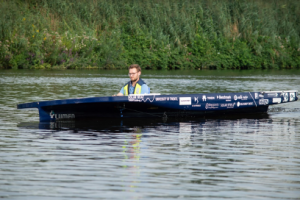
In 2017 I started studying Advanced Technology at the University of Twente. After two years of different aspects of technology and implementation of the technology, I decided that I wanted to know more about how the technology was used and what kind of people work at the different companies, and how the attitude at those companies and institutes was. Moreover, I was also very interested to get to know how it was to work on something for myself; not doing what the teacher tells you but trying to find out yourself what the best way is to tackle some problems.
My whole life I have always been attracted by water and when I made the decision of wanting to do one of the student teams, the choice of going to do Solar Boat Twente was easily made. Together with 14 other students, our goal was to complete a solar-driven boat that can sail on hydrofoils. Which will lift the boat out of the water when going 17 km/h or faster!
In the team, I was one of the hydrofoil engineers, where my focus was on the control of the wings. With a team of 3 students (Biomedical Engineer and Technical Businesses), we were burned to design foils to get the boat out of the water. In this process, we have designed and built the wing by ourselves, with some help from companies where we were able to either use their machines, expertise, or by borrowing their knowledge. This gave me a very worthful insight into the company life of a lot of companies. Next to the production of the wings, it was my responsibility to design a control system for this. Static wings are already used a lot and the next step for efficiency (but also to implement it in commercial boats) is to design systems to make boats fly stably based on sensors and dynamic wings. 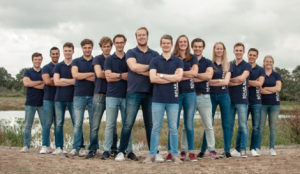
In this process a lot of different technical fields were of importance; choosing materials, calculating stiffnesses and strengths, drive the motors, model the dynamic behavior, implement and filter the sensors and design a control system to use the system. But during the year, I also gained a lot of insight into the organizational and communicational aspects of our team. Especially when we had to invent our system totally over due to the Corona pandemic.
As a team, we set the goal to fly with our boat stable and with that compete in the Solar Challenge in Monaco. It has not come that far, since the Covid-19 circumstances did change a lot for us. Companies got closed and we were not able to get the boat in the water with a limited number of students. This delayed our boat a lot and instead of doing a technical job we were more and more documenting for our successors how to continue. In the end, we were able to complete the boat and made some runs with it, which was an enormous success and adrenaline kick. After only having 1.5 full weeks of testing (instead of the scheduled 4 months) we participated in one friendly race in the Netherlands and although we did not win the game, we were very excited about what we did have fulfilled.
This year we will guide our new team on how to finish our boat and hope to see the boat flying! Once they go to the World Championships in Monaco, we will be their main supporters!